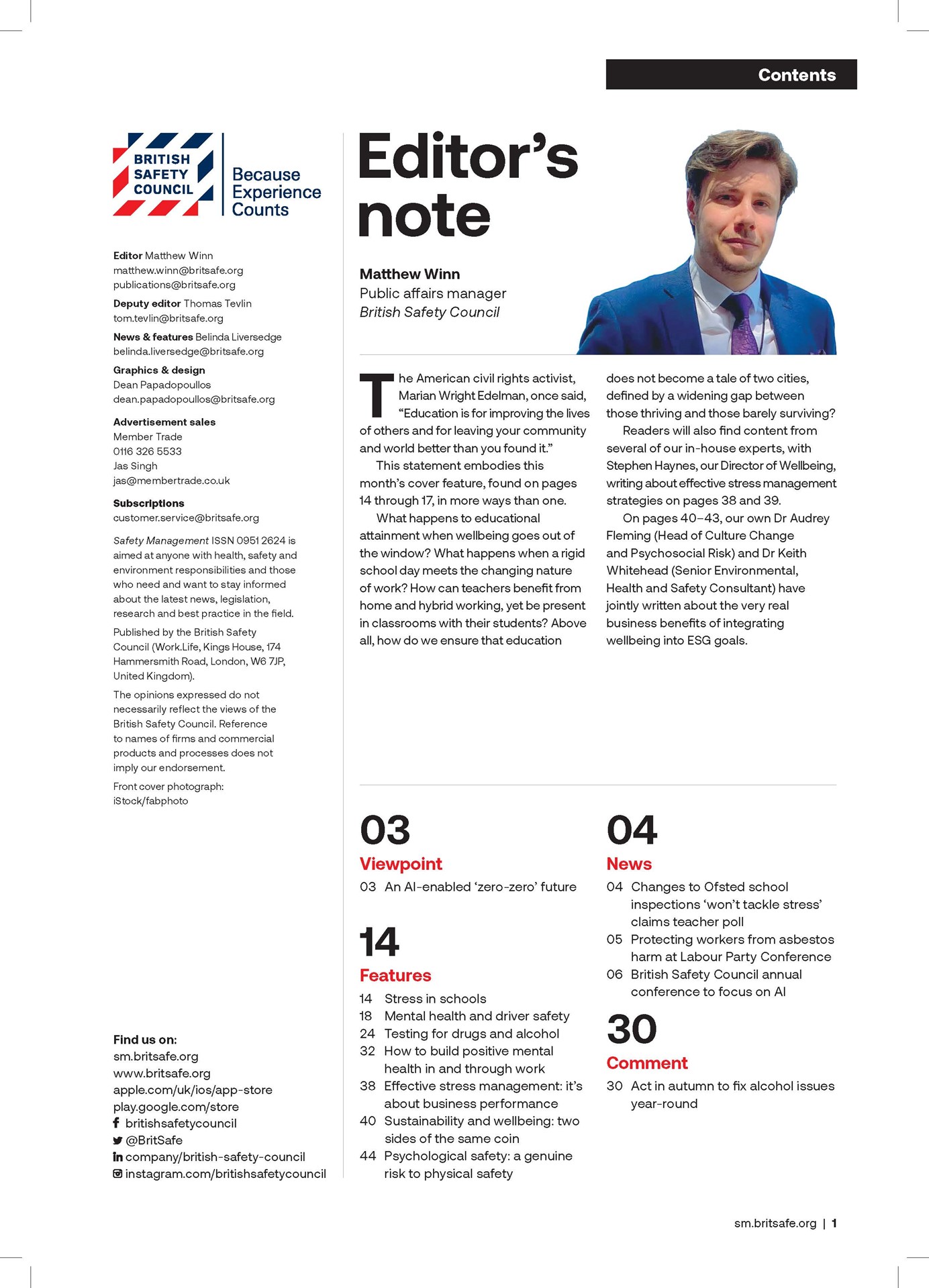Supporting workers’ mental health can reap benefits for a business, and one of the simplest ways to get started is to create an environment where everyone feels comfortable talking about their mental health and seeking help if they need it.
Features
Starting the conversation on mental health at work
For many of us, work is a major part of our lives. It is where we spend much of our time, it provides our financial security and is often where we make our friends. Having a fulfilling job in a supportive workplace is good for your mental health and wellbeing.
Good mental health at work and good management go hand in hand. There is strong evidence that workplaces with high levels of mental wellbeing are more productive. Employers and managers who invest in supporting good mental health and wellbeing at work will see many benefits from a more engaged and committed team, to increased efficiency and potentially higher returns.
 Claire Fleming, Communications & marketing manager (Scotland and NI) at Mental Health Foundation
Claire Fleming, Communications & marketing manager (Scotland and NI) at Mental Health Foundation
How can employers support staff?
We all have times when life gets on top of us. Sometimes it’s work-related like deadlines, clashing with colleagues, heavy workloads, long hours or extensive travel. Sometimes it’s something else – our health, our relationships, our caring responsibilities or our financial circumstances. It’s important that employers and workplaces are equipped to support staff during these times.
Managing mental health at work should be considered alongside business goals, employee engagement and productivity. Empowering organisations to create a culture where staff can have non-judgemental, human conversations around mental health in the workplace, and the things that are affecting it, will improve working lives; providing a supportive and open environment, where both people and businesses can thrive.
Employers can promote good mental health and wellbeing every day by providing a workplace that is an inclusive, welcoming and supportive environment.
Tips for team leaders:
It’s vital that employers offer the right support to employees who might need it. This includes staff knowing that they can talk about their mental health without fear of judgment, ensuring they have adequate time off to attend any appointments in relation to their mental health or making reasonable adjustments such as flexible working hours or home working.
It’s good to talk
One of the most important ways to support and maintain good mental health and wellbeing at work is to ensure that people feel comfortable talking about their mental health.
 Alison Pay, Managing director at Mental Health at Work
Alison Pay, Managing director at Mental Health at Work
Talking about your feelings can help you maintain good mental health when you are going through hard times. It’s not a weakness to talk about things that cause you stress or anxiety. It’s taking control of your wellbeing and doing what you can to stay healthy.
Many people may find it difficult to talk about feelings at work. That’s why open, supportive workplaces are vital. Staff should feel they can safely confide in managers, HR teams and colleagues.
Tips for team leaders
- Team leaders can normalise talking about mental health and wellbeing by making it a regular discussion at team meetings, in one-to-one catch ups and supervision sessions.
- When team leaders are open about their own wellbeing, it can encourage others to behave in the same way.
It can also help to utilise an awareness day to spark the conversation in a more informal way. The Mental Health Foundation runs Mental Health Awareness Week every May, giving people a great opportunity to talk about mental health and wellbeing. Next year it will take place from 15–21 May. Keep an eye on the Mental Health Foundation website for more details and downloadable events packs.
Employers may also like to run a Tea and Talk event in the workplace. This is a chance for colleagues to gather for a chat and raise money for the Mental Health Foundation, a UK charity that aims to find and address the sources of mental health problems so that people and communities can thrive. Event packs contain lots of information including conversation starters, talking points and actions to take.
Resources and training
There are many resources and training courses available to employers to better support good mental health in the workplace. Materials from the Mental Health Foundation can be found online at www.mentalhealth.org.uk, including the How to Support Mental Health at Work booklet. The booklet contains guidance on how to manage your own mental health at work, how to reach out to a colleague in distress and how to work with others to make your workplace more mentally healthy for everyone.
 We all have times when life gets on top of us. Photograph: iStock
We all have times when life gets on top of us. Photograph: iStock
Tips for team leaders
Download the How to Support Mental Health at Work booklet from the Mental Health Foundation website and share and discuss with staff.
Ongoing training for workplaces is important to ensure that employers are equipped to understand and manage mental health and wellbeing and make this an integral part of all workplace practices.
It is particularly important that anyone who has line management responsibility is trained to notice changes in their staff, begin an open conversation and signpost to support; the latest World Health Organization (WHO) report on Mental Health at Work concluded that this was the only intervention for which there was strong evidence of impact. Our subsidiary, Mental Health at Work, can design, develop and deliver customised mental health workshops and webinars which support open, human conversations about workplace mental health.
 There are many resources and training courses available to employers to better support good mental health in the workplace. Photograph: iStock
There are many resources and training courses available to employers to better support good mental health in the workplace. Photograph: iStock
These workshops and webinars equip employees with the knowledge and skills to break down stigma and manage mental health within their roles; improving working lives and helping organisations to thrive.
Mental Health at Work also offers one-to-one coaching for managers and leaders. This can support building skills, understanding and confidence to effectively manage the challenges they may face in developing and promoting a workplace mental health and wellbeing strategy and culture.
Tips for team leaders
Evaluate your current workplace mental health and wellbeing support structures to find out what’s missing and where additional guidance would be helpful. Make sure to include staff in the discussion.
For more information and advice see:
mentalhealth.org.uk
mentalhealthatwork.com
Claire Fleming is communications & marketing manager (Scotland and NI) at the Mental Health Foundation
Alison Pay is managing director at Mental Health at Work
FEATURES

Why menstruation support matters at work
By Deborah Garlick, Menstruation Friendly by Henpicked on 03 December 2025
Although forward-thinking organisations are increasingly taking action on menopause awareness and support at work, attention is now turning to menstrual health as the next essential step in building an inclusive, equitable and high-performing workplace.

Neurodiversity at work: getting started on creating a supportive environment for neurodivergent workers
By Andy Hooke CMIOSH Chartered health and safety consultant on 03 December 2025
Creating a neuroinclusive workplace brings many benefits, including making neurodivergent employees more comfortable about seeking help and support from managers and colleagues, and there are some simple ways of getting started with the process.

Human-centred technology for better work design: rethinking musculoskeletal disorder prevention
By Cam Stevens, Pocketknife Group on 03 December 2025
Although technologies like computer vision analysis, machine learning and wearable sensors are increasingly being used to identify and assess the causes of work-related musculoskeletal disorders (MSDs), it’s essential to consider data relating to all aspects of work design when seeking to reduce MSDs in the workplace.



